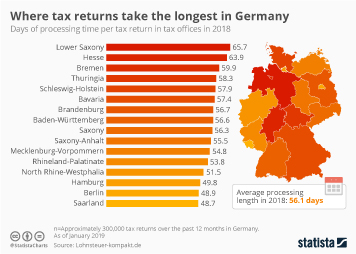Christian Lindner (FDP), Germany's finance minister, recently revealed important parts of the federal government's plan to change taxes.
Germany's leaders see changes to the way corporations are taxed as a good place to start. In the International Tax Competitiveness Index for 2022, the country was put 15th overall out of 38 OECD countries, but only 30th when it came to corporate taxes, which shows that there is room for improvement.
Improvements in Loss Treatment
The plan from the federal government wants to extend loss carrybacks from two years to three years and raise the maximum amount from 10 million euros to 20 million euros. Also, it would remove the 60 percent cap on taxed income over EUR 1 million that can be carried forward for an unlimited amount of time.Loss carryover rules let businesses use current year losses to cover future profits (called "carryforwards") or past profits (called "carrybacks"). Since an investment's or a business cycle's profitability can change a lot over time, carryover rules let businesses with cyclical or uneven income profiles even out their risk and income. This makes the tax code more neutral over time across investments.
For example, pharmaceutical businesses usually spend a lot of money on research and development (R&D) for a long time before their products start making them money. When loss offsets are taken out of the equation, the burden of corporate income taxation is too high for businesses with such variable income profiles. A good tax law would let businesses keep their losses for an unlimited number of years. This would make sure that a business is taxed based on how much money it makes on average over time.
During economic downturns, loss carrybacks are also a fast and effective way for businesses with a recent history of making money to get cash quickly.
Recent economic study shows that when the carryback period is extended by one year, businesses put more than 10% of their extra money into risky investments like research and development (R&D). This effect is stronger in places where business tax rates are higher.
At the moment, 15 of the 38 OECD countries have better carryforwards than Germany, while only Estonia, Latvia, and Canada have better carrybacks. With the changes that Lindner wants to make, Germany will join the top 10 countries that allow unlimited carryforwards and become more like Canada when it comes to carrybacks.
Estonia and Latvia, which are two of the three countries ahead of Germany in terms of carrybacks, have cash-flow company tax systems. These systems allow for unlimited income smoothing because profits are only taxed when they are distributed. Canada, on the other hand, lets you carry back taxes for three years with no limit on how much you can carry back. Recent policy changes have helped Germany move up in the list of countries with the most carrybacks. In 2020, the most that could be carried back went from EUR 1 million to EUR 10 million, and in 2022, the time that could be carried back went from one year to two years.
Dropping the Super-Deduction
The current tax reform plan is different from the super-deduction for climate and digital investments that the coalition had previously agreed on. Instead, the current plan calls for a "investment premium" equal to 15% of the cost of investing in "movable economic goods in the areas of energy and resource efficiency," with a cap of EUR 30 million per company and year.A super-deduction would let businesses subtract more than 100% of their investment costs from their future taxable income. This would make up for the fact that the tax system is biased against long-term investments. In comparison, an investment premium is the same for both short-term and long-term investments, so it doesn't do much to fix the short-sightedness of the tax system.
To make a tax system that is more focused on the future and helps the economy grow, the federal government should instead think about making big changes to cost recovery, like letting businesses deduct all of their investment costs from their taxable income. This is called "full expensing for capital investments." Also, there are good reasons why a plan like this should include a wide range of investment classes, not just approved investments in plans that save energy and resources.
For one thing, there are already good environmental laws in place, like the Emissions Trading System (ETS), which limits greenhouse gas emissions across the European Union. Cap-and-trade systems like the ETS are not only a better way to focus investment on reducing greenhouse gas emissions, but they also work against other policies that try to do the same thing. Since the number of available certificates determines how many greenhouse gases can be released under the ETS, policies that don't change that number won't reduce total emissions; they'll just move them to less valuable uses.
Second, making big changes to cost recovery would support a wide range of good long-term investments, not just a small number of qualified plans to save energy and resources. This could include investing in strong infrastructure, adapting to climate change, and other areas, but is not limited to them. In general, limiting improvements to cost recovery to a small base will slow down innovation.
The German tax system lets businesses get back 84.7 percent of the net present value of investments in machinery and equipment, 87 percent of the net present value of investments in intangible assets, and 39.1 percent of investments in industrial buildings in 2023. This is different from the standards for the OECD, which are 84.9, 74.9, and 48.9%, respectively. Full expensing or neutral cost recovery, on the other hand, would make Germany's tax scheme one of the most growth-friendly in the OECD.
Even though the full details of the reform plan haven't been released yet, the government can start with its promise to speed up depreciation for small investments.



























